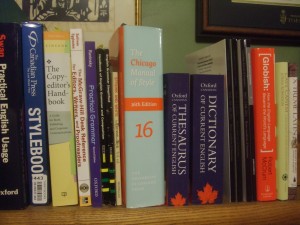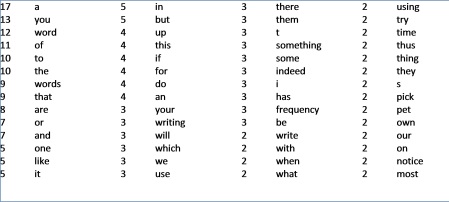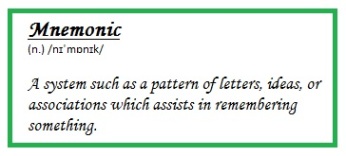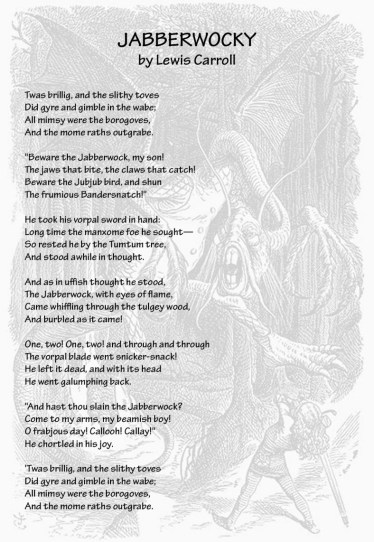Writing is tricky. Trying to express your meaning clearly can be hard enough, but also making it engaging can be quite the balancing act. As a writer, I’m still working on it, but as an editor, ill-considered or lazy writing jumps off the page at me like a facehugger from Aliens. While much of any writer’s voice is a product of their individual choices, there are a few words everyone needs to be wary of.

Some of these are ‘blah’ words, that don’t really carry any nuance or connotations; some of them are ‘pointy’ words that we throw in for emphasis or filler, to ‘point’ at other words, often when we don’t want to search for better phrasing. Many words have been tragically overused, and their meaning has become so lost that they are no longer of much use. There are also one or two ‘primer’ words that have haunted us since childhood, and lastly, each of us have our own favourite words or turns of phrase that we use too much, but I can’t help you with that. Be vigilant and wary for the ever-elusive favourite word, but in the meantime, here’s a list that might help.
1. Very– The pointiest of the pointy words.
This is probably one of the most overused and misused words in the English language, and it means almost nothing. People throw it in everywhere for emphasis when a better word could eliminate the need for it entirely. For example, “famished” sounds immeasurably better than “very hungry,” just as “furious” or “enraged” gets the message across more clearly than “very angry.” Then we get into the plainly ridiculous uses of the word, such as “very dead” or “very unique.” When you are describing something which is either there or it isn’t, emphasizing it doesn’t help; you can’t be “a little bit dead,” or “more unique than most.” Drop the “very” from your writing entirely, vary your vocabulary with other emphasis words, and for the love of your readers, don’t ever emphasize binary conditions.
2. Good, Bad, Nice– The ultimate blah trio.
I’ve lumped these together since they are all on the no-scribble list for the exact same reason; they are so generic they are practically meaningless. If you ask me how the movie was, and I say “nice,” what does that tell you about the movie? Nothing, except that I vaguely enjoyed it. While my opinion is relevant, of course, you might want to know more. It could have been “classic,” “visually spectacular,” “playful,” “satirical,” or any combination of dozens of adjectives that all tell you much more than “nice,” “good,” or “bad.” They’re boring, they’re generic, and while you may legitimately have to use them once in a while, you should try to avoid them wherever possible.
3. Because– The primary primer word.
There are times when one has to use “because.” it is a useful word, and one which has few synonyms, but using it too much, or in the wrong place, might come across as a bit early-childhood. It comes from how we were initially taught to answer questions in school: “Why is the dog outside? The dog is outside because he barked too much.” If too much of that translates into our writing now, we end up with things like, “The report was late because the input was late,” or “She couldn’t go because her mother wouldn’t let her.” Technically there is nothing wrong with these, but they evoke a grade school connotation that most writers want to avoid, especially when they are easy to fix. “Due to the delay in input, the report was also late,” and “Her mother would not let her attend, so she did not,” mean the same thing as the sentences above, but sound less clunky and more adult-like.
4. Alot– So blah, it’s not even a word.
Never use it. In fact, don’t use “a lot,” either, unless you are talking about a thing you park cars in, or that is measured by lots. It’s overused, generic, and there is always a better way to say that you have a large quantity of something. Really, there are a plethora, tons, immeasurable quantities, well, okay, a great deal of ways to get your point across without resorting to “a lot.”
5. Actually– The most pretentious pointy word.
Though sometimes misused, it is often correctly used as emphasis, “He actually expected me to help out!” or in its more useful form, as a way to differentiate, “You thought she was doing this, when she was actually doing that.” Either way, it gets used in far too many places. People also have a habit of starting rebuttals with “actually” (I’m guilty of this too, on occasion), and there it is excellent at conveying a sense of arrogant intellectual snobbery. So assuming you don’t want to be universally disliked, just try not to use it where it isn’t actually needed; your readers will like you more. Trust me.
6. Awesome – The flattest pointy word in the world.
Far from the awe-inspiring meaning it used to have, awesome is now just another word like “cool.” In fact, if you write using “awesome,” try replacing all instances of it with a word you wouldn’t use, like “groovy,” or “phat.” If it comes out looking odd, that’s because it is. Remove the “awesomes” from the page and it will make your writing that much more awesome.
7. Totally – The celery of words; nothing but filler.
No longer expressing a completeness or all-encompassing attribute, it is now mostly used as a strong affirmative or a generic pointy word, “It was totally amazing!” While something like that can be useful in casual speech, in writing it just fills space without purpose. It’s totally pointless; resist.
8. So – The overused, blah, filler, pointy word. Just stop.
While there are some legitimate, and necessary, places to use “so,” If you use it for verb emphasis it sounds juvenile; “I am so going to that kegger.” If you use it as a transition word, it ends up being unnecessary filler; “So, I went to the open house,” is no different in meaning from “I went to the open house.” So true. Speaking of which, using it for noun emphasis, while less ridiculous than other forms of emphasis, is still irritating to read, and rarely adds any meaning. It’s either true, real, over, empty, rockin’ or not. The “so” is irrelevant. Don’t be a so-and-so.
9. Really– The villain.
Much like “awesome,” “totally,” and similar words, it has lost most of its specific meaning in favour of generalities. Often it is considered interchangeable with “very” and is an equally poor choice. As an expression of affirmation or disbelief it has slightly more usefulness, as in, “Really? She said that?” and “Yes, she really said that.” It should really be avoided in almost all circumstances, though, as readers really find it annoying, it’s really likely your work will not be well received, and most editors will really tear your work apart. Really.
10. And Then– Just ugly.
Fine, it’s technically two words, and either of them are perfectly useful on their own, but when you combine them, you suddenly sound like you’re doing a grade two report. “We went home, and then we went to school, and then we went to the zoo…” You get the idea. There are much better ways to express consecutively timed events, I promise. There are several useful prepositions, and after you review them, following them up with some appropriate verbs, you may proceed to use them accordingly, and continuing along, can end by eradicating “and then” from your writing repertoire. While that’s going on, check out the bonus round below.
11. Common Verbs – The everyday words.
This is more of a category of words to watch out for and try to change up. Words including “like,” “went,” “said,” “got,” “seem,” “ask,” and “came,” among others, are such useful words that they are used with alarming frequency. It’s worth your time to check for synonyms and use them where you can so your work doesn’t sound too repetitive.
Bonus round: Don’t use elementary sentence structures
This isn’t about words, but short, declarative statements often fall into the category of ‘primer’ writing, which is no problem for a third-grader, but not likely to garner respect for an adult. Sentence structures with just the basic ‘subject verb object’ don’t convey much information and are jarring to read, not to mention wasting precious words that could be used to better effect. Statements like “The man saw Jane,” or “We finished the research. It proved our hypothesis,” sound much like “I hate jam,” and “My dog has spots. It wags its tail.” Vary your sentence lengths and use all the gifts of modern syntax available to you; clauses, prepositions, adjectives and adverbs are your friends. Don’t neglect them. I’ll be writing more about those as time goes by.
Remember, if you treat your words right, they will serve you well. Much like minions. Happy writing!

 Contractions are a common variant of homonyms; if the apostrophe doesn’t indicate a possessive, such as “Samantha’s book,” then it’s a contraction. They can often be eliminated as a confusing homonym by simply expanding the contraction.
Contractions are a common variant of homonyms; if the apostrophe doesn’t indicate a possessive, such as “Samantha’s book,” then it’s a contraction. They can often be eliminated as a confusing homonym by simply expanding the contraction.
